|
HOME: www.hiltonpond.org |
|||
THIS WEEK at HILTON POND Subscribe for free to our award-winning nature newsletter (Back to Preceding Week; on to Next Week) |
|
Join us for the |
|
All text, maps, charts & photos © Hilton Pond Center WANDERING WHITE-THROAT: Among our favorite e-mails these days is are those infrequent ones that come from the federal Bird Banding Laboratory with a subject line of "Report to Bander." Any such message can mean only one thing: Someone, somewhere, somehow has encountered a bird we banded sometime at Hilton Pond Center. When you consider how seldom we get such e-mails, you can understand why one we received on 7 December 2013 was met with excitement--and wonder. Since 1982 we have banded exactly 59,666 birds of 126 species at Hilton Pond. During the past 32 years, only 61 of those individuals have been reported from outside our home county of York SC--meaning our encounter rate is barely 0.1%--hence our excessive jubilation when that "Report to Bander" e-mail arrives. By comparison, of approximately two to four million birds banded annually in the U.S. and Canada, about 4% get reported, and at least half of those are waterfowl legally taken by duck and goose hunters; the remainder are spread around among all other North American bird species. (We should note another 34 of our birds have been reported from in-county locations AND we get countless numbers of returns and recaptures at Hilton Pond of birds we've banded locally.)
During the past three decades-plus, nearly half (48.4%) the birds we've banded at the Center have been one of four "winter finches" (House Finch, American Goldfinch, Purple Finch, and Pine Siskin), so it's not a surprise that those species make up the bulk of foreign encounters; 46 of our 61 reports are for those four finches. However, the "Report to Bander" we got this week was for our eighth-most-common species: White-throated Sparrow, Zonotrichia albicollis (above), a relatively common winter visitor from far-off Canada.
All text, maps, charts & photos © Hilton Pond Center The image above is the "Report to Bander" just received from the Bird Banding Lab and annotated in red for clarification. Reading from top to bottom (and correlating with black text at left) the page explains the bird in question was encountered by Antonin St-Jean and reported by him via the Bird Banding Lab's Web site on-line form.
All text, maps, charts & photos © Hilton Pond Center The birds, alas, was found dead after striking a stationary object--we suspect a window--in the courtyard of the biological sciences center at University of Quebec (above) on or about 10 November 2013. (We think it's pretty cool to be able to pull up Google Earth Pro and see the precise location where the bird was found.) The info below the blue line on the "Report to Bander" tells the rest of the tale: This was a White-throated Sparrow (WTSP) banded as #2281-11012 at Hilton Pond Center on 7 December 2006. On that date it was an immature bird hatched sometime in the summer of 2006, so at date of final encounter it would be classified according to BBL protocol as being in its eighth year--quite an advanced age and quite a long trip (822 straight-line miles) for a little bird that weighs only about an ounce. Despite its longevity, our bird was a whippersnapper compared to the oldest white-throat the BBL has on record: 14 years and 11 months for a bird still alive in Alberta, Canada in 2010. They also know of a couple of nine-year-old birds.
All text, maps, charts & photos © Hilton Pond Center After getting the report we checked our data files and learned that after getting banded in December 2006 this particular White-throated Sparrow returned to Hilton Pond Center (above) with a re-trap on 17 Nov 2007--after which it likely spent the winter before being trapped again on 21 & 24 April 2008. We recaptured it the next year on 19 Jan 2009 and again on 18 Jan 2010, after which we never saw it again locally. The bird may have been here in later years, but it didn't enter one of our traps or get mist netted in 2011 or thereafter.
All text, maps, charts & photos © Hilton Pond Center The bird just reported by Antonin St-Jean was only the second of 2,048 White-throated Sparrows banded at Hilton Pond to be encountered elsewhere (see map above). The first was #1341-59572, banded 15 April 1990 as an after-hatch-year adult of unknown sex and found even further north.
All text, maps, charts & photos © Hilton Pond Center Incredibly, this WTSP was encountered on 1 May 1990 by Mark Demers at Lake à la Ligne, Quebec (above), where it was caught by a cat! How unfortunate for a White-throated Sparrow to fly at least 970 straight-line miles from its South Carolina winter range and two weeks after banding be killed in Quebec on its probable breeding grounds . . . thanks to a free-roaming feline! (NOTE: Cat lovers, keep your cats indoors--for their sake as well as for the welfare of wildlife of all sorts. It's a matter of personal responsibility, and there are NO excuses for allowing your cat to mess with nature. we've heard them all, and none of them are valid.)
All text, maps, charts & photos © Hilton Pond Center It's hard to know why one of "our" White-throated Sparrows ended up in the courtyard of a building at metropolitan University of Quebec-Montreal, but as a probable window strike it illustrates another human-related danger (besides cats) that kills an incredibly high number of birds, especially during migration. The bird encountered at Lake à la Ligne might reveal an unsurprising coincidence in that this bird was captured in South Carolina beside a pond and later encountered in Quebec beside a lake. Within their breeding and wintering ranges White-throated Sparrows often occur in weedy fields and open woodlands near bodies of fresh water, so it may be when this bird flew south it simply sought a place that looked like "home" . . . and Hilton Pond nicely fit the bill. In either case, these two foreign encounters provide lots of food for thought and help explain why we band birds. We're grateful Antonin St-Jean and Marc Demers contacted the Bird Banding Lab about their finds, but it's too bad those far-ranging White-throated Sparrows had to perish to be reported. All text, maps, charts & photos © Hilton Pond Center All contributions are tax-deductible on your |
|---|
|
"This Week at Hilton Pond" is written and photographed by Bill Hilton Jr., executive director of Hilton Pond Center for Piedmont Natural History
|
|
|
Please refer "This Week at Hilton Pond" to others by clicking on this button: |
Comments or questions about this week's installment? Send an E-mail to INFO. (Be sure to scroll down for a tally of birds banded/recaptured during the period, plus other nature notes.) |

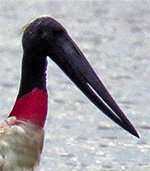
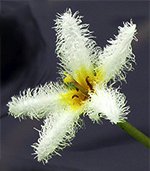
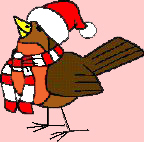
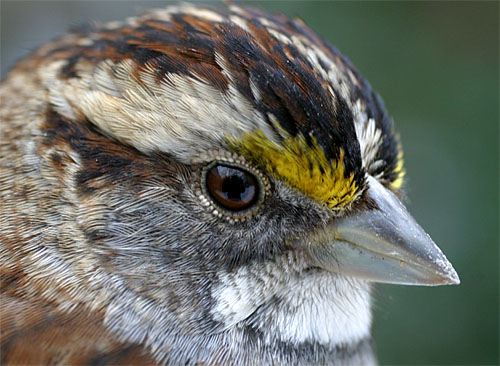
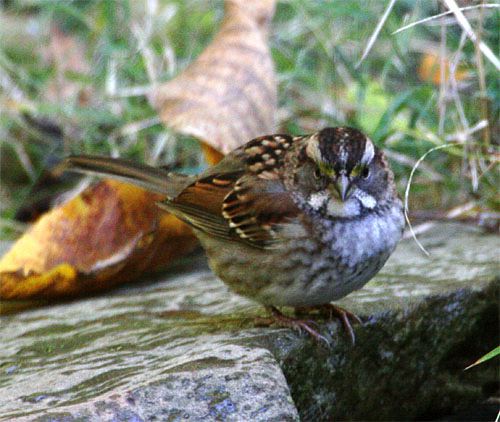
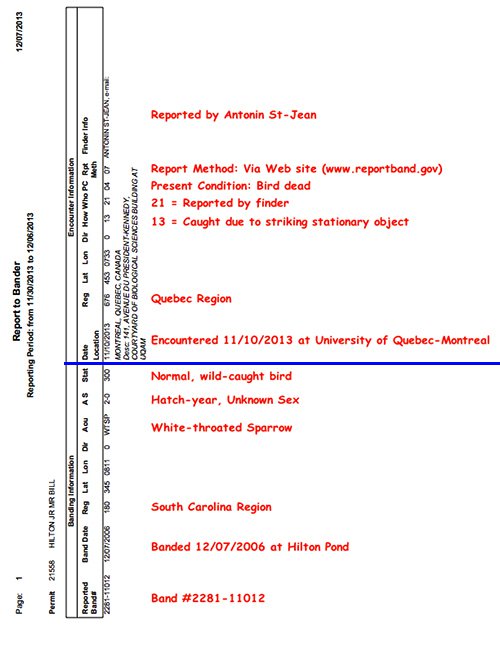
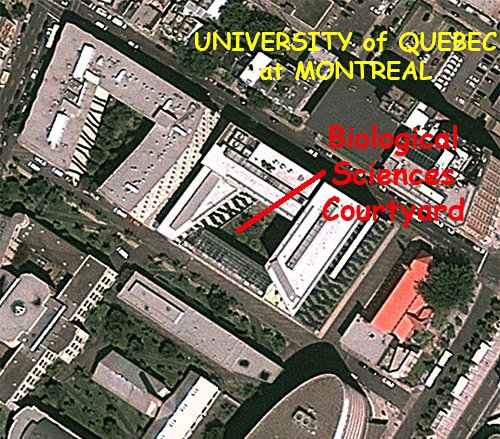
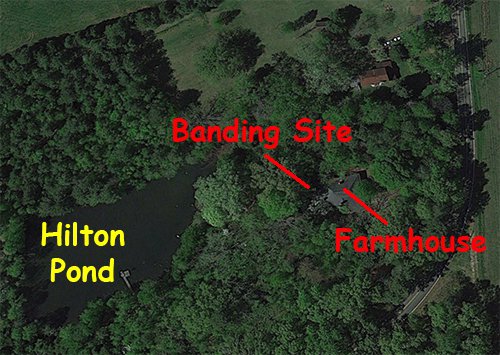
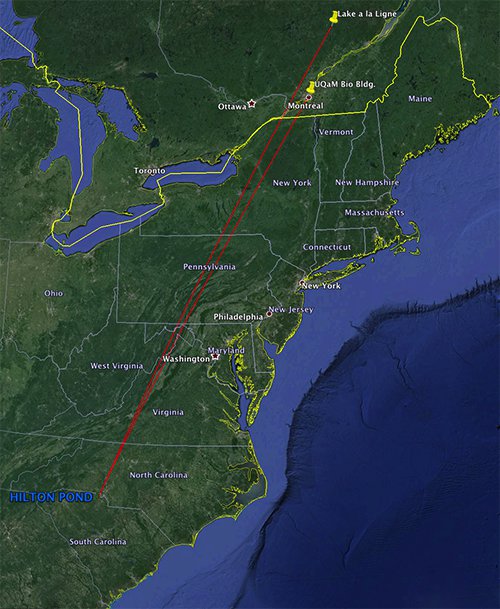

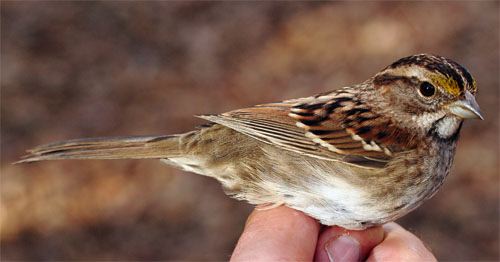

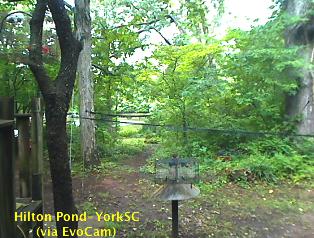

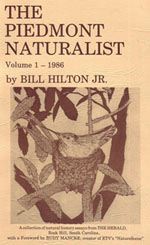



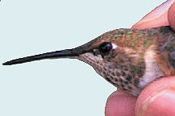 Oct 15 to Mar 15:
Oct 15 to Mar 15: